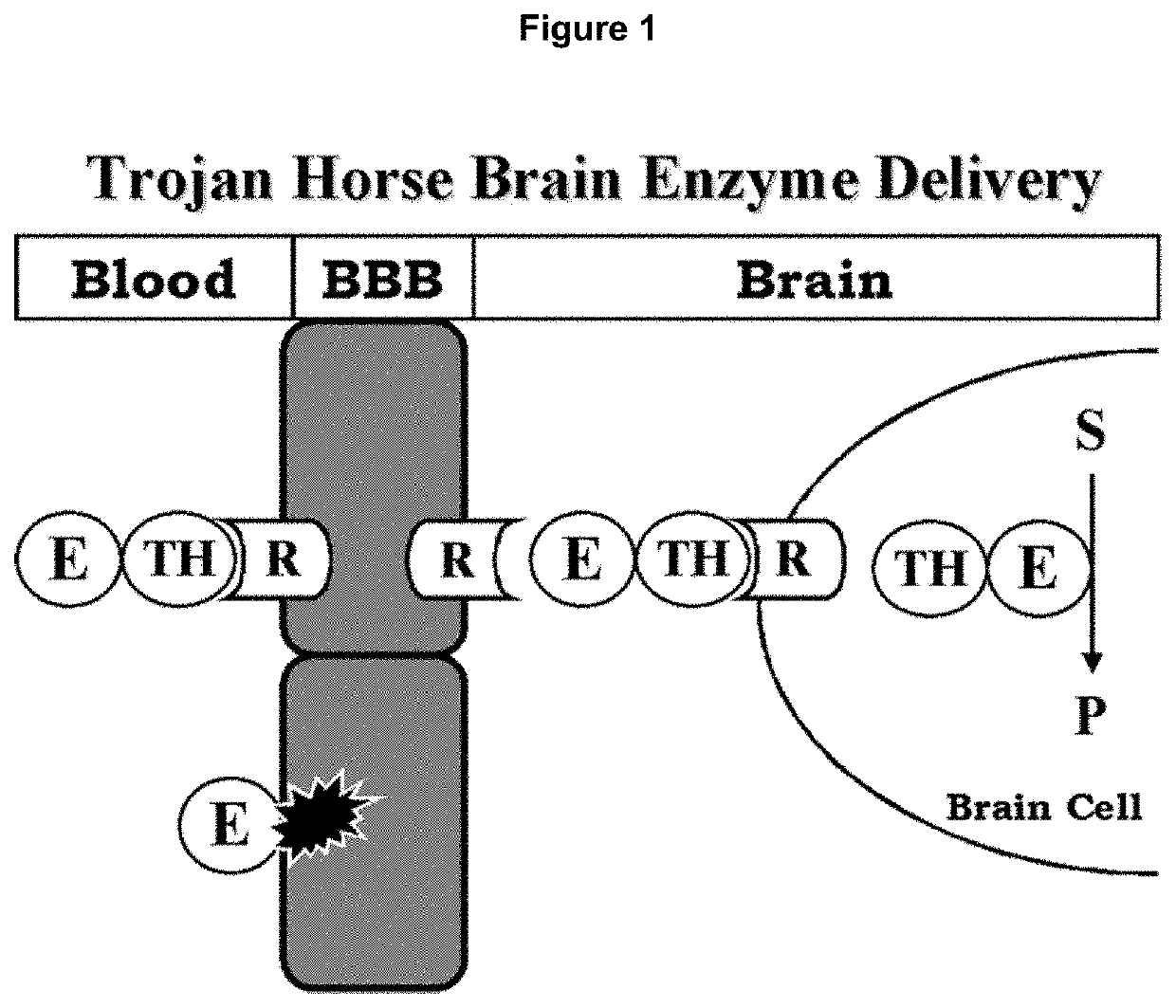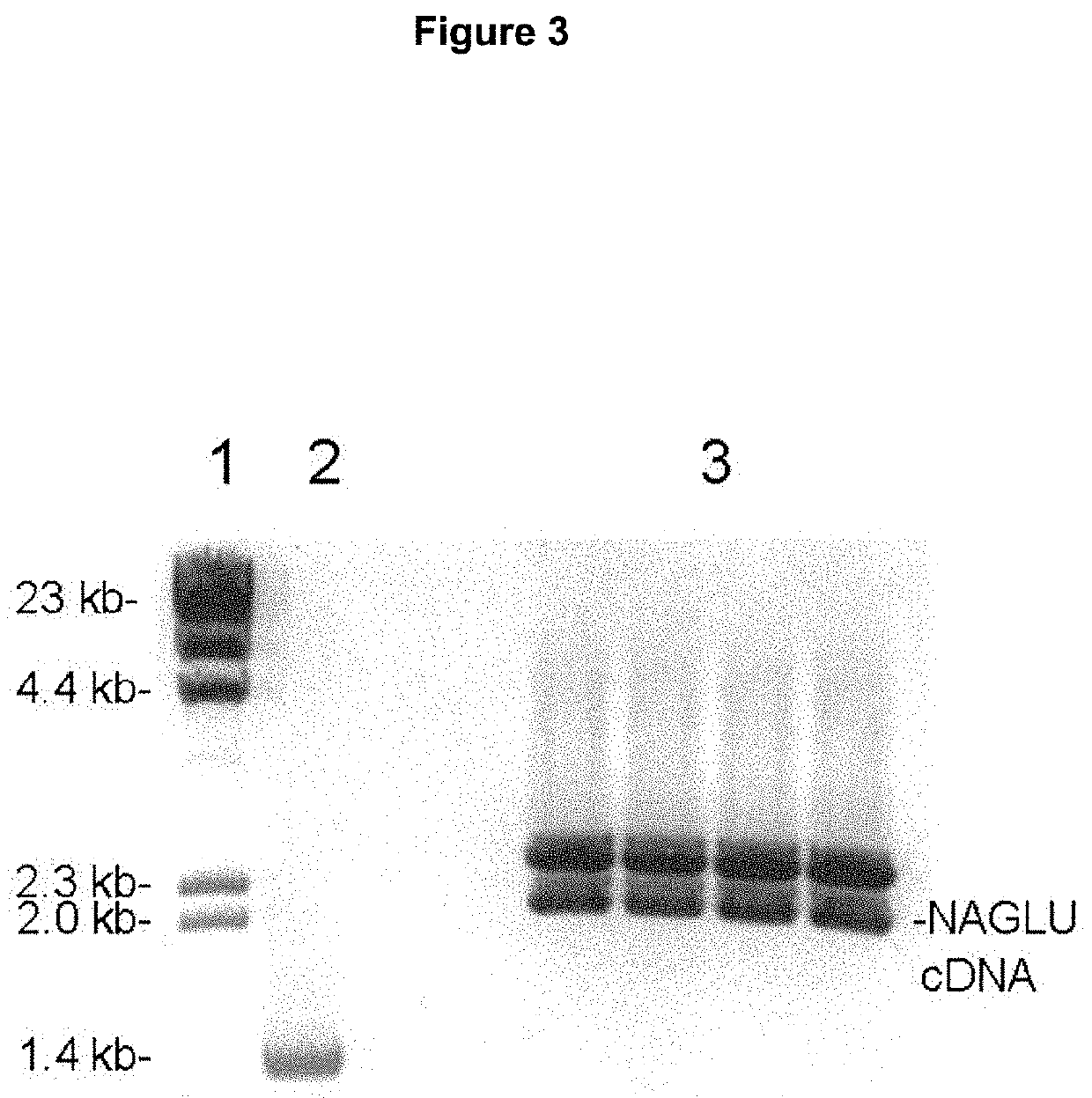Methods and compositions for increasing n-acetylglucosaminidase activity in the CNS
a technology of nacetylglucosaminidase and cns, which is applied in the field of methods and compositions for increasing nacetylglucosaminidase activity in the cns, can solve the problems of pathological buildup of glycosaminoglycans and little impact on the effects of disease, and achieve the effect of retaining naglu enzyme activity
- Summary
- Abstract
- Description
- Claims
- Application Information
AI Technical Summary
Benefits of technology
Problems solved by technology
Method used
Image
Examples
example 1
n and Functional Analysis of HIR Ab-GUSB Fusion Protein
[0205]The lysosomal enzyme mutated in MPS-VII, also called Sly syndrome, is β-glucuronidase (GUSB). MPS-VII results in accumulation of glycosoaminoglycans in the brain. Enzyme replacement therapy (ERT) of MPS-VII would not likely be effective for treatment of the brain because the GUSB enzyme does not cross the BBB. In an effort to re-engineer human GUSB to cross the BBB, a HIR Ab-GUSB fusion protein project was initiated.
[0206]Human GUSB cDNA corresponding to amino acids Met1-Thr651 of the human GUSB protein (NP_000172), including the 22 amino acid signal peptide, and the 18 amino acid carboxyl terminal propeptide, was cloned by reverse transcription (RT) polymerase chain reaction (PCR) and custom oligodexoynucleotides (ODNs). PCR products were resolved in 1% agarose gel electrophoresis, and the expected major single band of ˜2.0 kb corresponding to the human GUSB cDNA was isolated. The cloned human GUSB was inserted into a euk...
example 2
n and Functional Analysis of HIR Ab-GCR Fusion Protein
[0213]The lysosomal enzyme, mutated in Gaucher's disease (GD) is β-glucocerebrosidase (GCR). Neuronopathic forms of GD affect the CNS, and this results in accumulation of lysosomal inclusion bodies in brain cells, owing to the absence of GCR enzyme activity in the brain. Enzyme replacement therapy (ERT) of GD is not an effective for treatment of the brain because the GCR enzyme does not cross the BBB. In an effort to re-engineer human GCR to cross the BBB, a HIR Ab-GCR fusion protein project was engineered, expressed, and tested for enzyme activity. The human GCR cDNA corresponding to amino acids Ala40-Gln536 of the human GCR protein (NP_000148), minus the 39 amino acid signal peptide, was custom synthesized by a commercial DNA production company. The GCB cDNA was comprised of 1522 nucleotides (nt), which included the GCB open reading frame, minus the signal peptide through the TGA stop codon. On the 5′-end, a StuI restriction en...
example 3
ion of Human HIR Ab Heavy Chain-NAGLU Fusion Protein Expression Vector
[0217]The lysosomal enzyme mutated in MPS-IIIB is NAGLU. MPS-IIIB results in accumulation of heparan sulfate in the brain. Enzyme replacement therapy of MPS-IIIB is not effective for treatment of the brain because the NAGLU enzyme does not cross the BBB, as described by DiNatale et al (2005): Treatment of the mouse model of mucopolysaccharidosis type IIIB with lentiviral-NAGLU vector,” Biochem. 1, 388: 639-646. NAGLU was fused to the HIR Ab in order to develop a bifunctional molecule capable of both crossing the BBB and exhibiting enzymatic activity. In one embodiment the amino terminus of the mature NAGLU is fused to the carboxyl terminus of each heavy chain of the HIR Ab (FIG. 2).
[0218]It was unclear whether the enzymatic activity of the NAGLU would be retained when it was fused to the HIR Ab. The experience with IgG-GUSB and IgG-GCR fusion proteins described in Examples 1 and 2 illustrate the unpredictable natu...
PUM
 Login to View More
Login to View More Abstract
Description
Claims
Application Information
 Login to View More
Login to View More - R&D
- Intellectual Property
- Life Sciences
- Materials
- Tech Scout
- Unparalleled Data Quality
- Higher Quality Content
- 60% Fewer Hallucinations
Browse by: Latest US Patents, China's latest patents, Technical Efficacy Thesaurus, Application Domain, Technology Topic, Popular Technical Reports.
© 2025 PatSnap. All rights reserved.Legal|Privacy policy|Modern Slavery Act Transparency Statement|Sitemap|About US| Contact US: help@patsnap.com



